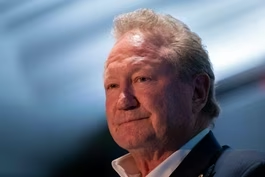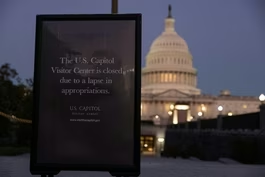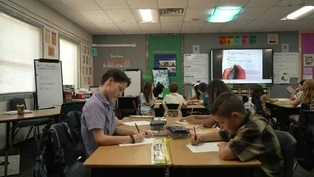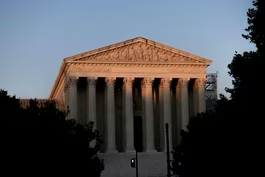
Democratic, GOP strategists on political fallout of shutdown
Clip: 10/15/2025 | 8m 16sVideo has Closed Captions
Democratic and GOP strategists on the political fallout of the government shutdown
It's Day 15 of the federal government shutdown, one of the longest lapses in funding in U.S. history. To discuss the politics of the shutdown, Geoff Bennett spoke with Democratic strategist Faiz Shakir and Republican strategist Doug Heye.
Problems playing video? | Closed Captioning Feedback
Problems playing video? | Closed Captioning Feedback
Major corporate funding for the PBS News Hour is provided by BDO, BNSF, Consumer Cellular, American Cruise Lines, and Raymond James. Funding for the PBS NewsHour Weekend is provided by...

Democratic, GOP strategists on political fallout of shutdown
Clip: 10/15/2025 | 8m 16sVideo has Closed Captions
It's Day 15 of the federal government shutdown, one of the longest lapses in funding in U.S. history. To discuss the politics of the shutdown, Geoff Bennett spoke with Democratic strategist Faiz Shakir and Republican strategist Doug Heye.
Problems playing video? | Closed Captioning Feedback
How to Watch PBS News Hour
PBS News Hour is available to stream on pbs.org and the free PBS App, available on iPhone, Apple TV, Android TV, Android smartphones, Amazon Fire TV, Amazon Fire Tablet, Roku, Samsung Smart TV, and Vizio.
Providing Support for PBS.org
Learn Moreabout PBS online sponsorshipGEOFF BENNETT: And for more on the politics of the shutdown, we're joined now by Democratic strategist Faiz Shakir and Republican strategist Doug Heye.
Great to see you both.
DOUG HEYE, Republican Strategist: Good to be with you.
GEOFF BENNETT: So there is a real disconnect between the pain that federal workers are experiencing and the lack of urgency among lawmakers on Capitol Hill.
How do you make sense of that gap?
DOUG HEYE: I think it's pretty simple.
And it's that history doesn't repeat itself, but it rhymes.
If we go back to the 2013 shutdown, Republicans said, we have to fight Obamacare.
We didn't have a strategy to land a punch, to win the round, to knock down our opponent.
And it blew up in our faces.
Democrats right now, what are they saying?
We have to fight Donald Trump.
It's not clear that they have a strategy to win the round, to land a punch, to beat Trump.
And so we have this impasse where you have two parties that are essentially communicating to their base.
Everybody who was in that package you played earlier is caught in the middle of these politics.
And both sides not only think they can win.
They think they are winning.
Now, that may be an impossible thing politically for both sides to win something.
But if there are no electoral impacts come November, they're going to maintain this position and this is going to go on a lot longer.
GEOFF BENNETT: How do you see it, Faiz?
FAIZ SHAKIR, Democratic Strategist: Well, the president's been sitting on the sidelines quietly.
And I think, at this point, Democrats had hoped that he'd be engaged.
He had that one meeting that you remember he brought Schumer and Jeffries in, threw some hats at them apparently, and did some sombrero memes after that meeting, and, since then, has really not engaged.
At one point, I remember, a few days ago, President Trump said, we're having negotiations with Democrats.
And he quickly had to walk that back.
And the irony of this whole thing is the Democrats have been offering a solution that works for him politically.
You don't want health care premiums to go up for 20 million people, do you, Mr.
President?
We're giving you a way out.
So, politically, you can see that there's a solution at the table for him that works as a win-win, actually.
And yet he's not engaged on it.
And I think he could -- if the president does get engaged, I think you could end this pretty quickly.
GEOFF BENNETT: You mentioned 2013.
We should say you were working then for them House Majority Leader Eric Cantor.
What are the biggest differences between now and then?
DOUG HEYE: In 2013, we were working our tails off.
I remember the first Saturday of the shutdown.
I got a text message from a friend at home in North Carolina who asked me if I was enjoying my vacation.
And I replied with some language I won't fully repeat here, but I told them -- it was about 9:30 in the morning on Saturday.
I was at my desk.
And every day we were having press conferences and we were passing bills.
Let's keep the Department of Education open.
Let's keep the Department of Energy open.
Mike Johnson has a very different Congress, a very different conference.
And he's doing things in a different way.
And I think he ultimately feels every time he -- I see him doing a press conference -- and he's all over the place, by the way, more than we typically see him -- his message is a very simple and defensible one.
Let's not hold the government hostage.
We have already passed this.
Let's just move forward.
We shouldn't do anything other than doing what we have already done.
And the ball's in the Senate's court.
The interesting thing here is, legislatively, the Senate, throughout all of this, has probably been more productive in the past two weeks than it has been in the past year.
GEOFF BENNETT: Well, they have been present in Washington in a way that the House hasn't.
And the politics, Faiz, for Democrats has changed dramatically considering what happened this past spring when they caught so much blowback for avoiding a shutdown.
FAIZ SHAKIR: Well, they got the right issue.
I mean, you think of the number one thing that most Americans are dealing with right now is unaffordability, cost of living.
We're seeing a play out in the New York City mayoral, which will propel I think Zohran Mamdani of winning that election.
And one of the reasons that that's going on is because they got the issue of health care.
Costs are going to go up through the roof unnecessarily, right?
You could have resolved this in the One Big Beautiful Bill.
They did not.
Now here we are sitting on potentially a very good, simple solution.
I'm sure, if Doug and I actually sat down, we could easily resolve it.
The solution is there.
You just say, well, you're going to reopen the government.
You don't necessarily have to attach the ACA subsidies to the reopening of the government.
But you agree that there's going to be a vote held right simultaneously after it, right, so that you will reopen the government, you have a vote on ACA subsidies.
I guarantee something like that is a simple enough solution that all sides could come together on.
GEOFF BENNETT: Yes.
There's a New York Times analysis that looks at the way the administration is using the shutdown to push through long-desired firings of federal workers and to really squeeze policy and agenda items in Democratic-led districts.
According to this analysis, more than $27 billion in halted federal grants have been in Democratic areas, compared to just $739 roughly million in Republican districts.
What's your read of this, Doug?
DOUG HEYE: Obama did some of this in 2013, but it was sort of like a Coke Zero version of what Donald Trump is going to do and has done.
And what surprises me about this is that the Democrats haven't learned some of our lessons.
When you have the message of fight before you have a strategy for what that is, in a shutdown, you give a president more power.
Barack Obama had more power.
George Bush during shutdowns -- whoever the president is gets more power of what they're able to do.
So, by having a message of fight, Democrats are giving Donald Trump a lot more power to do things that they don't want him to do.
That should be a problem for them.
GEOFF BENNETT: What about that?
FAIZ SHAKIR: On the Democratic side, I mean, this guy's already amassed power that he didn't have.
He's been acting illegally in all kinds of ways, firing federal workers well before this point.
So I don't think the biggest concern -- under normal circumstances, you would be concerned, oh, we don't want to give the president undue power.
This is not a president you're worried about.
So this is the one that you're more concerned around how do I message to people who voted for you?
I mean, you look at these districts, I think 80 percent of the ACA premium increases will hit places that voted for Donald Trump, states that he won.
And you're talking to those people and saying, this president is not focused on you and your needs.
And we have a very simple solution on the table.
I think the Democratic position on this bears well over time, by the way.
At the end of the year, that's when the tax subsidies expire.
If you're looking at the calendar of Congress, there's only about 30 legislative days left between now and then.
So when are you going to solve for this, Mike Johnson?
When are you going to solve for this?
There's only a small period of time, and I think the Democratic argument just gets stronger and stronger, especially as people get these notices that their premiums are about to go through the roof.
GEOFF BENNETT: Yes.
There's a question I have been putting to Democratic lawmakers who come on the program.
I will ask you this question.
Is there anything that Democrats can learn from the way the Trump administration has been playing hardball on some of these issues and apply it to how they might govern if they ever reclaim the White House or congressional leadership?
FAIZ SHAKIR: Listen, I mean, using executive power, he has put the bully in the bully pulpit.
And I don't agree with his values, but when you say he takes stake in Intel, he takes some stake in rare earth mineral companies, he goes after university presidents, he bullies media companies, you know well, I don't agree with the values.
But imagine if you had a better values orientation and you put the bully back in bully pulpit and said, we have certain outcomes we need to improve for working-class people's lives.
And I see the role of a president to assert it aggressively and to urge you, not acting unlawfully, but to urge you with my values and with my public argument that I'm going to change your behavior.
A lot could be done.
And certainly Trump has showed the way for hopefully a next Democratic president to say you have laid the table for us to act in ways that improve the lives of regular working-class people in ways that we wouldn't have done before.
GEOFF BENNETT: There is no off-ramp insight for this, for ending this shutdown.
They're not even talking, the different parties.
How long do you think this is going to go?
DOUG HEYE: It'll go past Halloween.
For me, I think maybe one of the pressure points maybe when we get to Veterans Day, especially if veterans pay or pay for our military becomes an issue.
But neither side sees a reason to back down right now.
They both feel not only right in their cause, but righteous in their cause, which means there's no incentive at this point for them to move together at all.
GEOFF BENNETT: Faiz?
FAIZ SHAKIR: I mean, I was talking -- you said, what did you learn from Trump?
He took stake in Intel, right?
You could take stake in the UnitedHealth Group.
Here's a company that's depriving people of health care.
You're going to get -- lots of people are going to die in this year unnecessarily.
That -- to my mind, fix a UnitedHealth Group, fix a broken health care system.
This is the path for Democrats to regain their footing on how you fight for regular working-class people and carve into some of the support that Donald Trump has previously held, because I think a lot of people are feeling let down.
This isn't what I voted for.
He is not focused on cost of living needs that I care most about.
GEOFF BENNETT: Faiz Shakir, Doug Heye, it's good to see you both.
DOUG HEYE: Thank you.
GEOFF BENNETT: Great conversation.
FAIZ SHAKIR: Thank you.
Billionaire mining executive betting on green energy
Video has Closed Captions
Clip: 10/15/2025 | 5m 54s | Why a billionaire mining executive is betting on green energy (5m 54s)
Federal workers on how the shutdown is upending their lives
Video has Closed Captions
Clip: 10/15/2025 | 8m 4s | Federal workers describe how the shutdown is upending their jobs and daily lives (8m 4s)
How students are faring in Arizona's voucher program
Video has Closed Captions
Clip: 10/15/2025 | 8m 23s | How students are faring in Arizona's voucher program that could be adopted nationwide (8m 23s)
News Wrap: Pakistan, Afghanistan agree to ceasefire
Video has Closed Captions
Clip: 10/15/2025 | 5m 16s | News Wrap: Pakistan and Afghanistan agree to a 48-hour ceasefire after days of clashes (5m 16s)
Palestinians return to ruins where homes once stood
Video has Closed Captions
Clip: 10/15/2025 | 8m 18s | Palestinians return to ruins where homes once stood as Israel awaits remains of hostages (8m 18s)
What justices signaled in Supreme Court redistricting case
Video has Closed Captions
Clip: 10/15/2025 | 7m 21s | What the justices signaled in a Supreme Court case that could reshape electoral maps (7m 21s)
Providing Support for PBS.org
Learn Moreabout PBS online sponsorship
- News and Public Affairs

FRONTLINE is investigative journalism that questions, explains and changes our world.

- News and Public Affairs

Amanpour and Company features conversations with leaders and decision makers.












Support for PBS provided by:
Major corporate funding for the PBS News Hour is provided by BDO, BNSF, Consumer Cellular, American Cruise Lines, and Raymond James. Funding for the PBS NewsHour Weekend is provided by...





